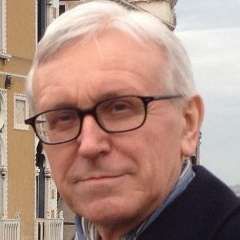This was the last night of the A Festival of New Music held in Berlin’s Pierre Boulez Saal, curated by Daniel Barenboim and flautist Emmanuel Pahud. Ten contemporary composers had each written a new work for small ensemble, between five and ten minutes long, with world premieres given online. Every player and composer contributed gratis. A cynic might observe that concerts of only new music are ideal for a hall with no audience, since that is what would occur anyway in many locations. But when the “location” is the internet, and the composers were of the stature of Jörg Widmann, Olga Neuwirth, Matthias Pintscher and others, then we have a real festival. Each concert began with “old” music – by Pierre Boulez, his music gracing his eponymous hall.
Boulez’ Dérive 1 (1984) is for flute, clarinet, violin, cello, piano, and vibraphone. Six instruments playing for six minutes, yet its complexity is such that most performances follow Boulez's instructions and use a conductor. Daniel Barenboim’s cues certainly seemed indispensable in this intense, glowing performance. The piece is “derived” from the two compositions Répons (1981) and from Messagesquisse (1976/77). The latter was performed earlier in the festival, and contributed the harmonic material built on the name “Sacher” translated into German notation. But with Boulez, the music is much more fascinating than arid explanations of its origins. Here it was the sequence of trills of the first half that were so compelling, along with the frequent arabesque-like figuration. (Surprisingly perhaps one of Boulez’s favourite works was Debussy’s Arabesque no.1).
Christian Rivet’s Terre d'ombres for solo flute offered a great contrast to the density of incident of that opening work, as it featured many long notes separated by silence. “Does the silence interrupt the music, or the other way round?” wondered Barenboim afterwards. The score, Emmanuel Pahud revealed, features the phrases “only the silence”, “only the breath” and “pure sound”. The work’s title (Land of Shadows) was reflected by the hall being kept mostly deep in shadow, with Pahud performing from the top tier, a spotlight enabling his shadow to be thrown onto the wall behind. This enhanced the crepuscular effect of the piece, its deep melancholy giving a sense that we were hearing a revenant of some more full-bodied work, haunting this empty space.
Empty space was in fact the title of the final piece, by Jörg Widmann. It too was dramatically staged, the five players more distant from one another than health regulations require, each in a separate pool of light but enveloped by the dark, wraiths brought together for a ghostly gig in Berlin. It too featured a wind player’s breathing (Widmann himself, who played clarinet), which Pahud observed also gave them the opening tempo, it had plenty of colour – the percussionist seemed set up for a performance of Turandot. Definitely one to hear again, as these programmes remain available free on-demand for 30 days.
This was also a “Festival of Talk about Music” – music occupying less than half the broadcast time of this occasion. In between, lightly compered by Philipp Brieler, dramaturg of the Pierre Boulez Saal, Pahud and Barenboim discussed the pieces, while Widmann joined on Zoom to introduce his own piece. There were some points about the atmosphere of the unusual setting, and possible follow-ups, including playing all ten new pieces again in the hall before an audience, perhaps paired with items of late Beethoven. That seems exalted company, provoked by Barenboim’s recalling Stravinsky’s celebrated description of the Grosse Fugue as “a contemporary piece that will be contemporary for ever”. But it could make fascinating listening.
This performance was reviewed from the video live stream.




